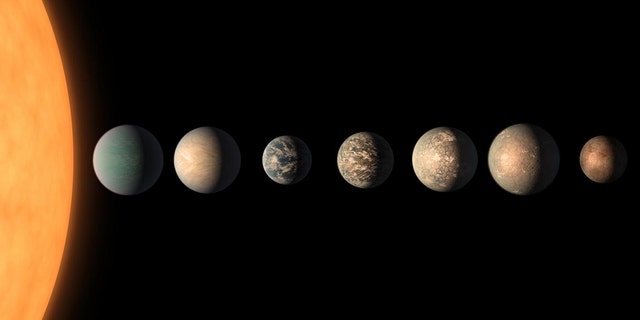Earth's oceans have made it the perfect environment for biodiversity, but a new study suggests that it may not have the best conditions in the galaxy.
The study suggests that exoplanets that have "favorable ocean circulation patterns" could be better suited to support a wider range of life than Earth.
"This is a surprising conclusion," said lead researcher Dr. Stephanie Olson of the University of Chicago in a statement. "It shows us that conditions on some exoplanets with favorable ocean circulation patterns could be better suited to support life that is more abundant or more active than life on Earth."

This artist's concept shows what the TRAPPIST-1 planetary system may look like, based on available data about the planets' diameters, masses and distances from the host star, as of February 2018. 3 of the 7 exoplanets are in the 'habitable zone', where liquid water is possible. (Credit: NASA/JPL-Caltech)
NASA TO EXPLORE JUPITER'S MOON EUROPA, WHICH MAY HOLD LIFE
Olson, who presented the research at the Goldschmidt Conference in Barcelona, said that life on Earth is dependent upon the upward flow of the oceans, which brings back nutrients from the deepest part of the ocean to the top, where photosynthetic life is abundant.
"More upwelling means more nutrient resupply, which means more biological activity," Olson added. "These are the conditions we need to look for on exoplanets."
Olson and the other researchers used a series of computer models to see which exoplanets could have the conditions for efficient ocean upswelling.
"We found that higher atmospheric density, slower rotation rates, and the presence of continents all yield higher upwelling rates," Olson said in the statement. "A further implication is that Earth might not be optimally habitable--and life elsewhere may enjoy a planet that is even more hospitable than our own."
Georgia Institute of Technology assistant professor Chris Reinhard, who was not involved in the study, said that researchers expect oceans "to be important in regulating some of the most compelling remotely detectable signs of life on habitable worlds," but added that the understanding of oceans beyond the solar system "is currently very rudimentary."
It's highly likely that oceans are common throughout the Milky Way galaxy. NASA's Kepler space telescope and other instruments have suggested that one in four stars hosts an Earth-like planet, but with current technology limitations, these exoplanets have to be studied from afar.
MYSTERIOUS ALTERNATING CURRENTS FOUND ON JUPITER
Despite these constraints, Olson's hypothesis, which Reinhard called "a significant and exciting step forward," is that it's expected that life "is almost certainly more common than 'detectable' life.
"This means that in our search for life in the Universe, we should target the subset of habitable planets that will be most favorable to large, globally active biospheres because those are the planets where life will be easiest to detect--and where non-detections will be most meaningful," Olson said.
Recently, data from NASA’s Spitzer Space Telescope gave scientists the first glimpse into conditions on the surface of a rocky exoplanet, Planet LHS 3844b. The exoplanet, which is 48.6 light-years from Earth and has a radius 1.3 times that of Earth, according to NASA, is orbiting a small star called an M dwarf. It was first spotted by NASA’s Transiting Exoplanet Satellite Survey in 2018.
Though NASA's search for life has largely focused on planets that are in the "habitable zone," the space agency recently announced that it would explore Jupiter's icy moon Europa to see if it "could harbor conditions suitable for life."
CLICK HERE TO GET THE FOX NEWS APP
https://www.foxnews.com/science/exoplanets-better-suited-for-life-earth
2019-08-26 12:38:22Z
CBMiR2h0dHBzOi8vd3d3LmZveG5ld3MuY29tL3NjaWVuY2UvZXhvcGxhbmV0cy1iZXR0ZXItc3VpdGVkLWZvci1saWZlLWVhcnRo0gFLaHR0cHM6Ly93d3cuZm94bmV3cy5jb20vc2NpZW5jZS9leG9wbGFuZXRzLWJldHRlci1zdWl0ZWQtZm9yLWxpZmUtZWFydGguYW1w
Bagikan Berita Ini















0 Response to "Alien planets could be better suited for life than Earth: study - Fox News"
Post a Comment